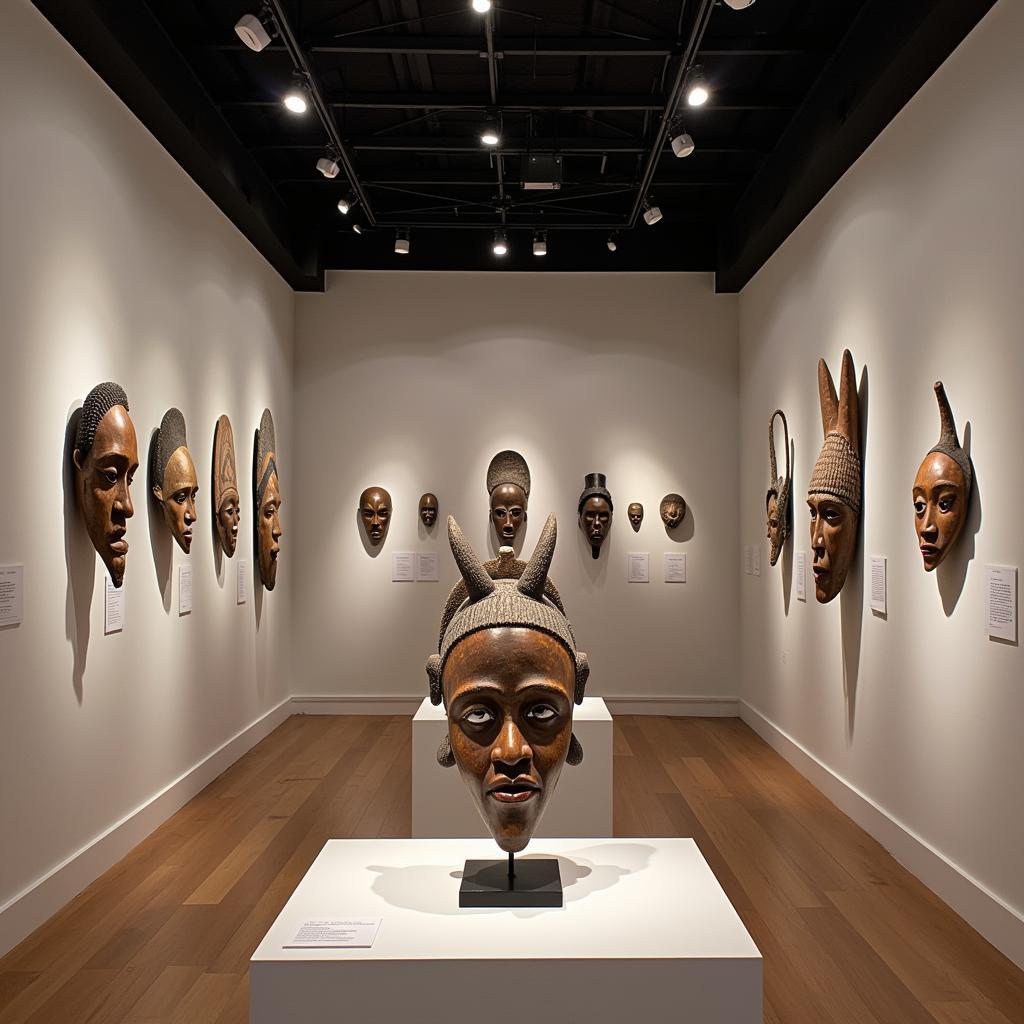Unveiling the Mysteries of African Face Mask Art
African Face Mask Art holds a significant place in African culture, representing far more than mere decoration. These intricate creations serve as powerful symbols, embodying spirituality, ancestral connections, and social roles within various communities across the continent. From their diverse materials and craftsmanship to their profound cultural meanings, African face masks offer a glimpse into the rich tapestry of African Life. Let’s explore the captivating world of African face mask art.
Exploring the Significance of African Face Mask Art
African masks are more than just static objects; they are active participants in ceremonies, rituals, and performances. They are often used in dances that celebrate important life events, such as harvests, initiations, and funerals. These masks can represent spirits, deities, ancestors, or even abstract concepts like beauty or justice. The use of masks allows individuals to transcend their everyday identities and connect with a realm beyond the human.
Materials and Craftsmanship of African Face Masks
The creation of an African face mask is a meticulous process, often involving skilled artisans who have inherited their knowledge and techniques through generations. african face mask drawing Traditionally, masks are carved from wood, though other materials like bronze, ivory, terracotta, and textiles can also be used. The specific type of wood chosen can hold symbolic meaning, with some african hardwood species being associated with particular spirits or powers. The masks are often adorned with pigments, feathers, beads, shells, and other decorative elements that further enhance their symbolic significance.
The Cultural Context of African Face Mask Art
Each African mask tells a unique story, reflecting the specific traditions and beliefs of the community from which it originates. For example, masks used in initiation ceremonies often feature fierce expressions to intimidate and test the initiates. Masks representing ancestors might depict serene or wise faces, symbolizing the guidance and protection they offer. Masks can also embody moral values or social roles, acting as visual reminders of societal expectations.
Unveiling the Spiritual Power of African Masks
In many African cultures, masks are believed to possess a spiritual essence that connects the wearer to the supernatural world. The act of putting on a mask is not merely a costume change, but a transformation. The wearer becomes the embodiment of the spirit or entity represented by the mask. This transformation allows for communication with the spirit world, seeking guidance, protection, or blessings.
“Masks are not simply objects of art,” explains Dr. Abena Kwesi, an expert in African art history. “They are living entities, imbued with power and meaning. They are the bridge between the physical and spiritual realms.”
The Evolution of African Face Mask Art in a Modern World
While African face masks remain deeply rooted in tradition, they have also evolved in response to changing times. Contemporary artists are incorporating new materials and techniques, while still drawing inspiration from traditional forms and meanings.  Modern African Mask Exhibition These modern interpretations reflect the ongoing dialogue between past and present, tradition and innovation.
Modern African Mask Exhibition These modern interpretations reflect the ongoing dialogue between past and present, tradition and innovation.
“The beauty of African mask art lies in its ability to adapt and evolve,” adds Adebayo Ola, a renowned Nigerian mask maker. “It continues to speak to us today, carrying the weight of history while embracing the possibilities of the future.”
African Face Mask Art: A Timeless Legacy
African face mask art is a testament to the creativity and spirituality of African cultures. These powerful objects continue to fascinate and inspire, offering a window into the rich tapestry of African history, beliefs, and artistic expression. african bench furniture By understanding their significance, we can appreciate the enduring power of African art and its contribution to global cultural heritage. Remember, African face masks are far more than beautiful objects; they are living embodiments of culture, tradition, and spiritual belief.
FAQ
- What is the purpose of African face masks?
- What materials are used to make African face masks?
- How are African face masks used in ceremonies?
- What is the significance of the different designs and symbols on African face masks?
- Where can I learn more about African face mask art?
Further Exploration
For more insights into African culture and traditions, explore related topics such as african black soap benefits for acne.
When you need assistance, please contact us via Phone: +255768904061, Email: [email protected] Or visit us at: Mbarali DC Mawindi, Kangaga, Tanzania. We have a 24/7 customer support team.

